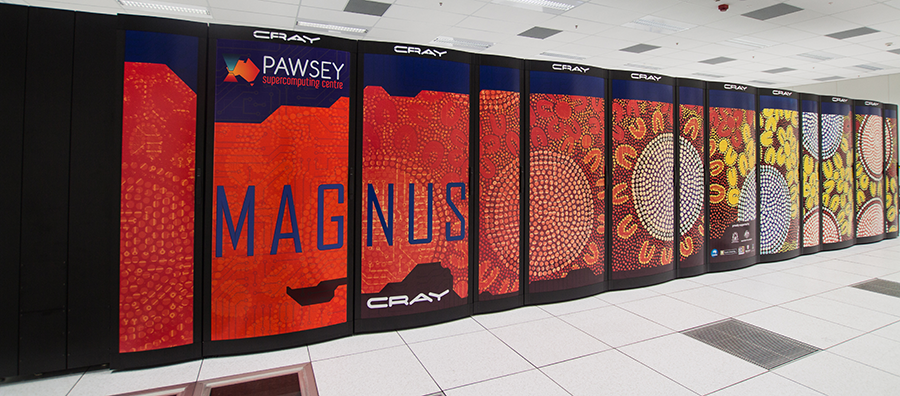
Behind the scenes in a supercomputer at the Pawsey Centre.
The Pawsey Centre is Western Australia’s supercomputing centre, an unincorporated joint venture between CSIRO, Curtin University, Edith Cowan University, Murdoch University and The University of Western Australia and is supported by the Western Australian and Federal Governments. ICRAR is one of Pawsey’s principal users and, as a member of the Science Data Processor (SDP) Consortium, Pawsey is a key collaborator in the SKA Pre-construction.
The Pawsey Centre houses ‘Magnus’ and ‘Galaxy’, two of the most powerful supercomputers in world.
In 2009, as part of their Super Science Initiative, the Australian Government allocated $80M to build the Pawsey Supercomputing Centre with the primary aim of supporting the SKA pathfinders and Western Australia’s bid for the SKA. ‘Galaxy’ is currently a real-time processor for ASKAP and is also used to process MWA data.
The processing power of Western Australia’s supercomputers is astonishing. The most powerful of the group is ‘Magnus’ (Pawsey Centre), capable of 1,097 TerraFLOPS (1,000,000,000,000,000 calculations per second), making it the most powerful supercomputer in the Southern Hemisphere and a top 100 supercomputer in the world. The internode communications in the supercomputer are nearly 10,000 times faster than the National Broadband Network (NBN).

Magnus at the Pawsey Centre, the most powerful supercomputer in the Southern Hemisphere!
MWA Data Archive
A landmark achievement of ICRAR’s DIA program is the implementation of the Murchison Widefield Array (MWA) data archive at the Pawsey Centre and the global distribution of MWA data. The MWA archive consists of dataflow and storage sub-systems across three tiers, supported by core software – the Next-Generation Archive System (NGAS) – and iVEC supercomputers. NGAS has been designed to optimise data flow and management, as well as cost-effective and secure storage, access and migration.
- The MWA archive collects and stores 8-10TB (1TB = 1000 GB) of data daily, with a current total data volume in excess of 10PB (1PB = 1 million GB), the majority of which is in the Pawsey Supercomputing Centre.
- Over 1.5PB of MWA archive data has been successfully transferred to the Massachusetts Institute of Technology (USA) at a peak rate of 350MB/s.
- MWA archive data accessed daily by scientists exceeds 50TB—equivalent to over 70,000 files per day.